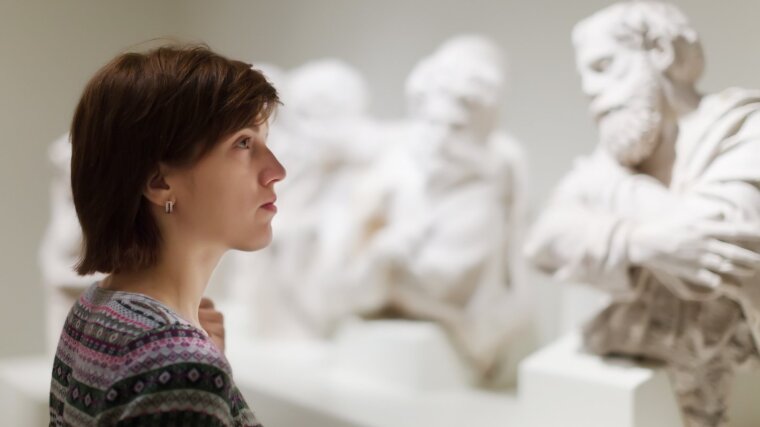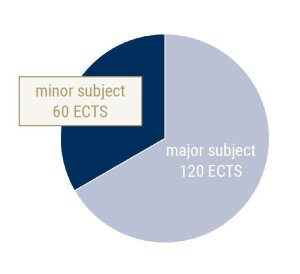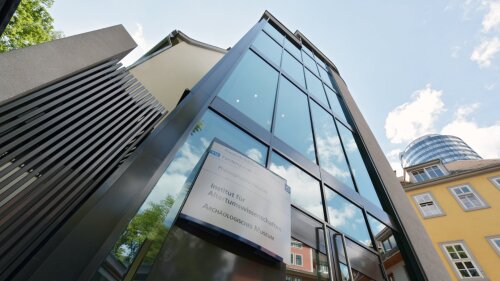
Programme content
If you want to understand contemporary society, politics and culture, you have to look back to antiquity. Students enrolled on our bachelor’s programme in ‘Ancient History’ unpick the foundations of the modern world by delving into the period between the 2nd millennium BC and the 7th century AD. They deal with the key events, structures and protagonists of Greek and Roman history and the entire Mediterranean region.
The introductory modules in ‘History’ and ‘Classics’ will familiarize you with basic facts and provide an initial overview of various working methods. You will then look at concrete examples and gain your first experience in dealing with various ancient sources and ancient historical working methods. You will gradually learn more about different periods of Greek or Roman history and get a taste for related historical disciplines such as epigraphy (study of inscriptions) and numismatics (study of coins).
In-depth reading of historical sources is also part of the syllabus, especially in the fifth and sixth semesters. Various types of sources such as letters, poems and speeches – but especially historiography – form the basis of ancient historical research. That’s why you will learn to check the authenticity of surviving texts and explore the writer’s motives so that you can ultimately draw conclusions from them. This background knowledge will make it easy for you to get involved in topical research discussions and make an active contribution to research.
Structure
Multi-subject bachelor’s programme
Picture: Sophie BartholomeA bachelor’s degree is the first professional qualification that can be obtained at a university. The standard length of the programme is six semesters, and different types of courses are offered for each module (e.g. seminars, lectures or practical classes).
A multi-subject bachelor’s programme consists of a major subject worth 120 ECTS credits (1 ECTS credit = 30 hours for attendance, preparation and follow-up work, private study, assessed coursework and examinations) and a minor subject worth 60 ECTS credits.
If you take ‘Ancient History’ as a minor subject, you will cover a total of six compulsory modules.
How might your degree programme shape up?
The following table shows the possible structure of your degree programme with ‘Ancient History’ as your minor subject:
| Semester | Modules |
| 1 to 2 |
|
| 3 to 4 |
|
| 5 to 6 |
|
Abbreviation: ECTS = European Credit Transfer and Accumulation System (credit points)
You can find more detailed information in the module catalogue for the degree programmeExternal link.
Why study in Jena?
- Close networks: Our faculty shares common focuses not only with other departments within Classical Studies and History, but also with other related disciplines such as Cuneiform Studies, Caucasian Studies and Ancient Church History. This means you can find out how interdisciplinary research works during your studies!
- Books and more: The central university library has a number of significant old holdings. You will also find the latest specialist literature in the smaller humanities library. That’s exactly what you need!
- A world of possibilities: Experience our international flair! Our University appeals to students and researchers from all over the world and helps to shape Jena’s character as a cosmopolitan city that is fit for the future – it’s the perfect place for international studentsmp4, 57 mb · de.
- Adventures abroad: You can easily realize your dream of spending a semester abroad. We have a global network of partner universities.
What can you do after your studies?
Career opportunities:
Student browsing a bookshelf
Image: Designed by gpointstudio / freepik.comThe skills acquired during your bachelor’s degree will open up career prospects in a wide variety of areas, which will vary depending on the major subject you choose. Ancient History is relevant in a wide range of fields, including the following:
- Education and culture
- Museums
- Libraries and manuscript collections
- Associations and publishing houses
Downloads and links for the degree programme
What are we looking for in prospective students?
- An interest in historical topics
- An interest in exploring ancient languages, culture and history
- An interest in working with texts – reading ancient sources is the most important aspect of the degree programme
Admission requirements
-
University entrance qualification
A university entrance qualification, such as a general secondary school leaving certificate, is required for admission onto the study programme.
More information on university entrance qualifications can be found here.
-
Language requirements
Admission and language requirements for applicants of foreign nationality and without German Abitur: www.uni-jena.de/en/study-orientation-international
Proof of Latin proficiency must be provided by the time of registration for the Bachelor's thesis. Knowledge of two modern foreign languages (level B1) is also required.
Contacts
Room 302
Fürstengraben 25
07743 Jena
Google Maps site planExternal link
Opening hours:
By appointment
Room 305
Fürstengraben 25
07743 Jena
Google Maps site planExternal link
Opening hours:
By appointment
Bachstraße 18k
07743 Jena
Telephone hours:
Mondays and Fridays (9:00 – 11:00)
Wednesdays (13:00 – 15:00)
The ASPA is primarily responsible for students in the Faculty of Social and Behavioural Sciences, the Faculty of Arts and Humanities, and the Faculty of Theology.
Postal address:
Akademisches Studien- und Prüfungsamt
Fürstengraben 1
07743 Jena
Fürstengraben 25
07743 Jena
Google Maps site planExternal link
University Main Building / SSZ
Fürstengraben 1
07743 Jena
Google Maps site planExternal link
Office hours:
We offer consultations in person, by telephone, and via Zoom. You can make an appointment by calling us on +49 3641 9-411111 (Mondays to Fridays from 9:00 to 11:00) or outside these office hours on +49 3641 9-411200. You can also use our remote help desk.
Consultation hours:
Mondays, Tuesdays, Thursdays and Fridays (9:00 to 12:20), Tuesdays (14:00 to 18:00), and Wednesdays and Thursdays (14:00 to 16:00).
Video chat: To the video chat – Zoom Videochat ZeitenMondays to Fridays (12:30 to 13:00) Password ZSB2020 Data protection informationpdf, 101 kb
University Main Building, Room E065
Fürstengraben 1
07743 Jena
Google Maps site planExternal link
Opening hours:
Information Desk (UHG; Room E0.65)
Mondays (10:00 – 12:00)
Tuesdays (13:00 – 15:00)
Wednesdays (10:00 – 12:00)
Thursdays (13:00 – 15:00)
Fridays (10:00 – 12:00)
You can also use our remote help desk at
www.uni-jena.de/service-ssz
or send us your enquiries by post.
Telephone hours:
Mondays to Fridays
(9:00 – 11:00)
Postal address:
Friedrich-Schiller-Universität Jena
Studierenden-Service-Zentrum
07737 Jena
University Main Building
Fürstengraben 1
07743 Jena
Google Maps site planExternal link


